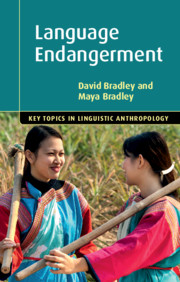Book contents
- Language Endangerment
- Key Topics in Linguistic Anthropology
- Language Endangerment
- Copyright page
- Contents
- Tables
- Acknowledgements
- 1 Introduction
- 2 Stages of Language Endangerment
- 3 Working in a Community
- 4 Identity and Attitudes
- 5 Language Knowledge and Use
- 6 The Sociolinguistic Setting
- 7 Linguistic Processes
- 8 Policy and Planning
- 9 Language Reclamation
- 10 Methodology
- 11 Conclusion
- Glossary of Terms
- References
- Index
- References
4 - Identity and Attitudes
Published online by Cambridge University Press: 11 November 2019
- Language Endangerment
- Key Topics in Linguistic Anthropology
- Language Endangerment
- Copyright page
- Contents
- Tables
- Acknowledgements
- 1 Introduction
- 2 Stages of Language Endangerment
- 3 Working in a Community
- 4 Identity and Attitudes
- 5 Language Knowledge and Use
- 6 The Sociolinguistic Setting
- 7 Linguistic Processes
- 8 Policy and Planning
- 9 Language Reclamation
- 10 Methodology
- 11 Conclusion
- Glossary of Terms
- References
- Index
- References
Summary
Identity is complex, multifarious and fluid. Groups define themselves and others with names, by group and other categories and their composition and with their attitudes (Llamas & Watt, 2010), and in many other ways (Fishman, 1977, 1989). These combine to form individuals’ identities – overt and covert, often multiple and shifting. Where enough of this is negative, the result may be language endangerment. Thus, changing negative attitudes is one of the most important precursors for language reclamation (Chapter 9).
- Type
- Chapter
- Information
- Language Endangerment , pp. 64 - 83Publisher: Cambridge University PressPrint publication year: 2019



